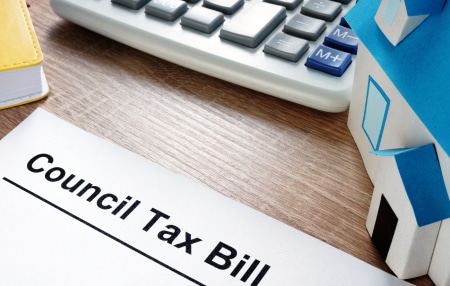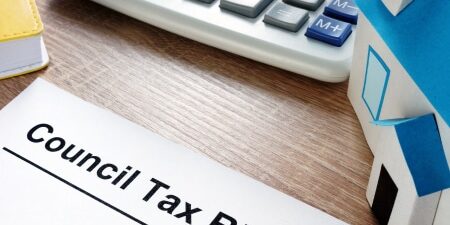
Dealing with council tax debt can be stressful and confusing, especially if you’re already struggling with other financial obligations and different forms of debt. In this guide, we aim to help you understand the consequences of not paying your council tax and explore the options available to manage or even write off this debt.
What happens if you don’t pay your council tax?
It goes without saying that failing to pay your council tax can have serious repercussions – both personally and financially. Local authorities take non-payment seriously and have a structured process for recovering unpaid council tax.
Initially, you will receive a reminder notice if you miss a payment. If you don’t pay within seven days of this reminder, you could lose the right to pay in instalments, and the full year’s council tax will become due as a default. If you still fail to pay, the council can apply for a liability order in court, which is a legal demand for payment.
The consequences of a liability order can include additional costs added to your debt, bailiffs being instructed to recover the debt, deductions from benefits if you’re receiving them, and ultimately, imprisonment for non-payment. While imprisonment is uncommon, legally this can still occur.
For more information on what council tax debt could mean, see Council Tax Debt Help and Advice.
In debt and can’t pay council tax arrears: What are your options?
If you’re unable to pay your council tax arrears due to debt, you have several options that can help manage the situation. Below, we take a look at these options. However, whatever you do, it’s important to act as early as possible to avoid escalating the problem.
Speak to your local authority
Your first port of call should be to contact your local authority. Councils may be willing to negotiate payment plans tailored to your financial situation. By explaining your circumstances, you might be able to arrange smaller, more manageable payments over an extended period. This approach can prevent further legal action and additional costs.
Can you put council tax on a Debt Management Plan?
A Debt Management Plan (DMP) is an informal agreement between you and your creditors to pay off your non-priority debts (e.g. credit cards, unsecured loans or buy now pay later). A DMP can help you by reducing your monthly payments to a more affordable level, stopping further interest and charges on your debts, and allowing you to consolidate your debts into one monthly payment. However, as council tax is considered a priority debt, it’s unlikely this would be covered in a DMP.
It’s also important to note, because a DMP is informal, your creditors are not obligated to accept the terms.
Can council tax be included in an IVA?
An Individual Voluntary Arrangement (IVA) is a formal agreement with your creditors to pay off your debts over a period, usually five to six years. Unlike a DMP, an IVA is legally binding and can include both priority and non-priority debts, such as council tax arrears.
Priority debts include:
- mortgage or rent arrears
- gas and electricity arrears
- council tax or rates arrears
- magistrates’ court fines
- income tax or VAT arrears
- TV licence or TV licence arrears.
An IVA can provide significant relief by writing off a portion of your debts once it is successfully completed. It also offers legal protection from your creditors, meaning your local council would not be able to take further action against you.
Moreover, it simplifies your debt payments into a single monthly payment based on what you can afford.
If you’re looking for advice on debt solutions such as IVAs and DMPs, you can speak with an expert debt advisor at MoneyPlus today.
Does Bankruptcy clear council tax debt?
Bankruptcy is a legal process for individuals unable to repay their debts. When you declare Bankruptcy, most of your debts, including council tax arrears, are written off.
While Bankruptcy can provide immediate debt relief, with most of your debts cleared, protection from legal action by your creditors, and a fresh financial start once the period has ended, there are also serious consequences you need to consider before taking this option.
For example, Bankruptcy typically results in the loss of personal assets, such as your home and car, which may be sold to pay off your debts. It will also have a negative impact on your credit rating for six years, making it difficult to obtain credit, and imposes restrictions on certain types of employment and business activities.
Council tax can be daunting, but understanding your options can help you manage and potentially write off this debt. Whether it’s through negotiating with your local authority, setting up a DMP, entering an IVA, or considering Bankruptcy, there are ways to address your financial difficulties.
Taking prompt action and seeking professional advice can prevent further legal complications and help you regain control of your finances.

To discover more about how to manage your debt and to receive free debt advice, you can visit www.moneyhelper.org.uk.

